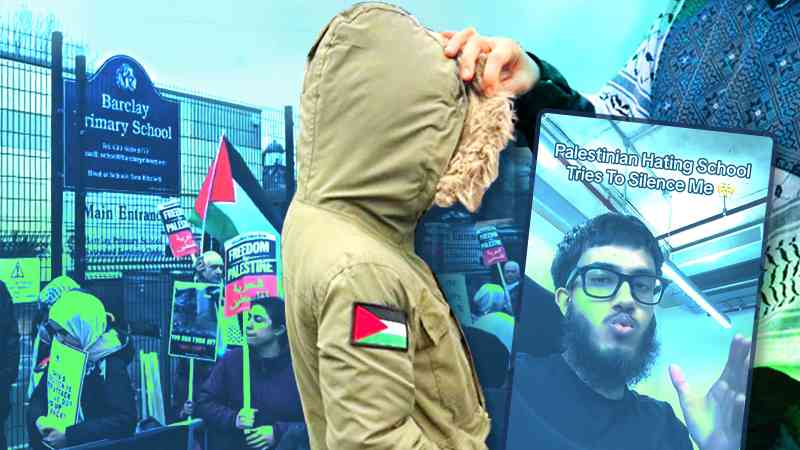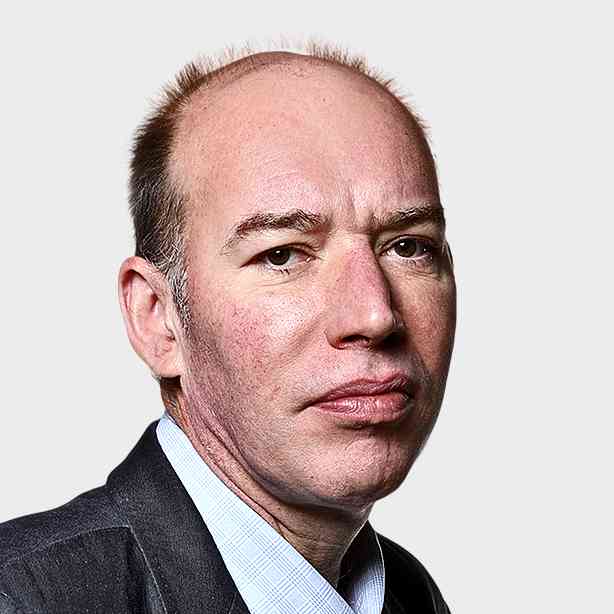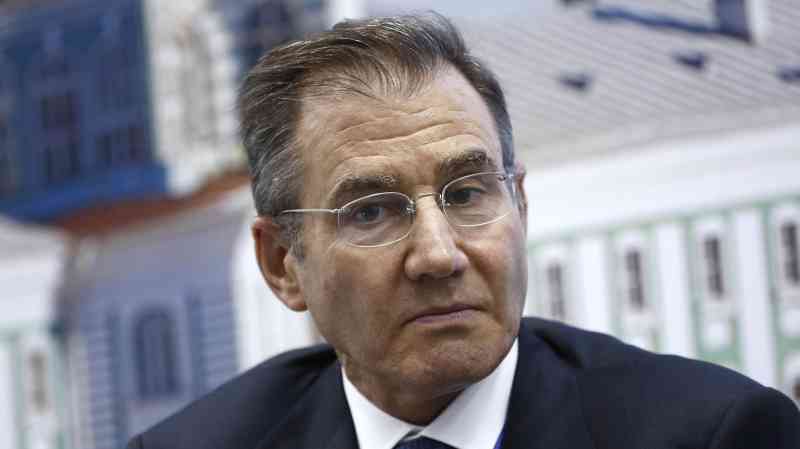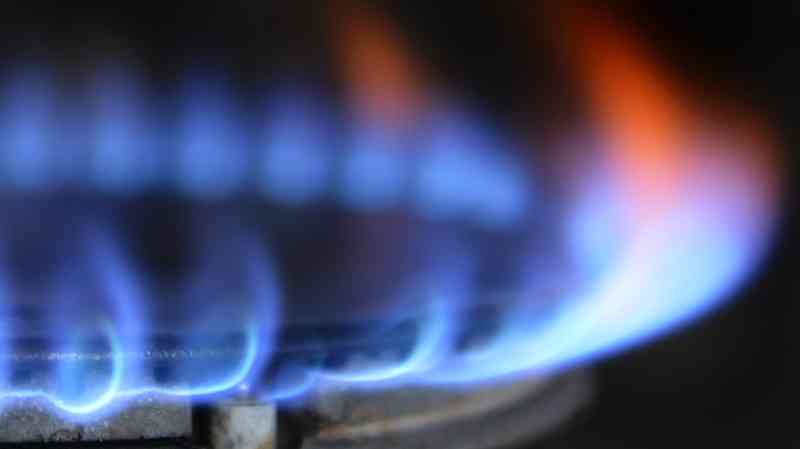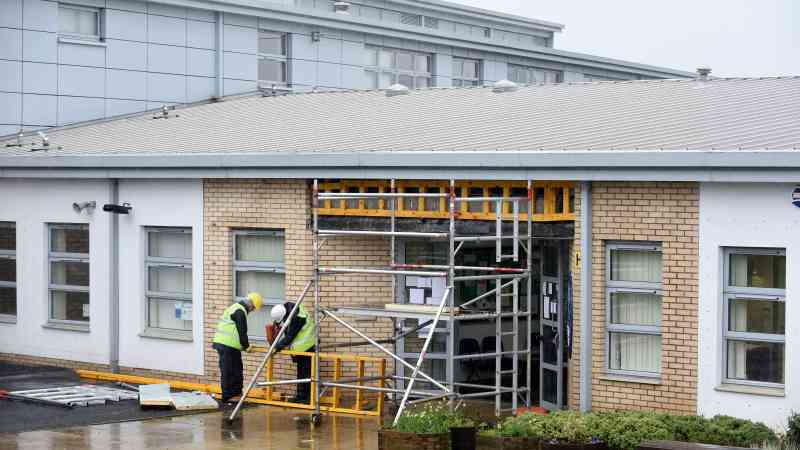Inside the primary school row over a pro-Palestinian badge
Eight-year-old Yahya sits in the front room of his family home in Leyton, east London, working through an English paper under the watchful eye of his mother.
Later that afternoon they will visit a local museum exhibition. Mathematics revision is planned the following morning, followed by a walk in the park. But this is no ordinary homeschooling story.
Yahya, a Year Four pupil at nearby Barclay Primary School, has not attended school for more than six weeks after he was stopped from wearing a pro-Palestinian badge on his clothing on Children In Need day.
Uniform disputes are ordinarily managed within the confines of the classroom, but the argument over Yahya saw the school face bomb and arson threats and force it to close early before Christmas, citing the escalating risk to staff. The new term began with a warning that it might have to revert to online learning if it continued.
The school, led by its chief executive Justin James, had previously hit out at online disinformation after a social media storm was fuelled by an aspiring TikTok influencer who declared: “Barclay Primary School is basically saying that if you support Palestine, you’re going to become a terrorist — or you already are one.”
A protest organised by parents outside the school attracted so-called “professional agitators” with no links to the institution, The Times can reveal. Stop the War, which has separately organised school walkouts over Palestine, had earlier helped facilitate a wider protest in the east London borough against the “censorship of students”.
Yahya’s father, Shahid Achhala, and his mother, Rasha, have accused the school of discrimination, which it strongly denies, and say they want an apology before their son will return.
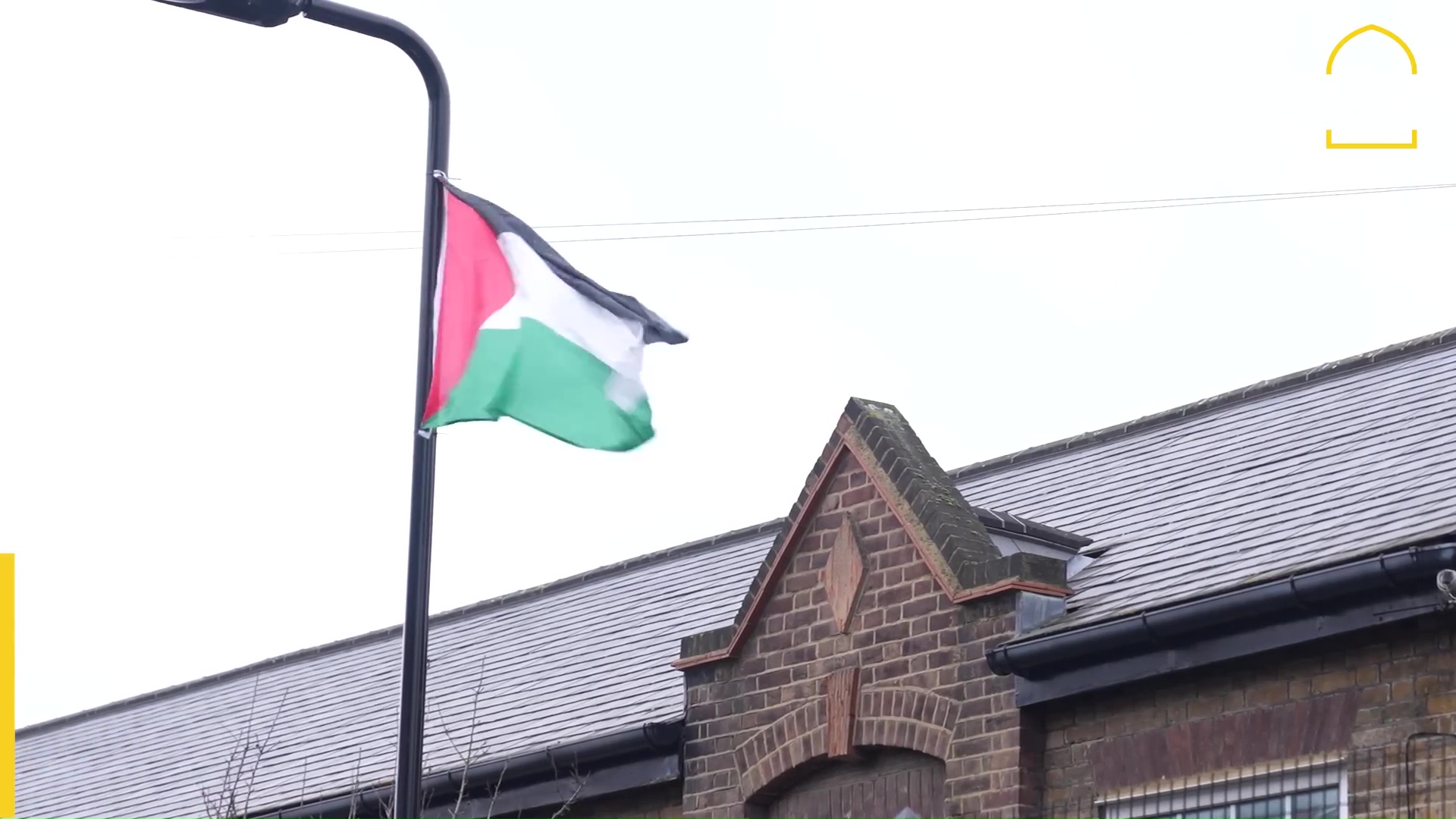
Giving their first newspaper interview, they denied the badge was political and insisted Yahya was punished for an innocent gesture in which he wanted to pay tribute to family members who have died in Gaza.
But the threats and ongoing controversy illustrate the difficulties facing teachers at a time of raised geopolitical, religious and cultural tensions.
Gillian Keegan, the secretary of state for education, said on Friday that she recognised the challenges that teachers faced navigating complex discussions about global events.
She said: “We have been clear they must do so in an impartial way, whilst ensuring all pupils feel safe in a calm and supportive learning environment. No teacher should be the subject of intimidation or threats when going about their work. My department is in regular contact with Barclay Primary School to support them through this difficult time.”
Prevent warnings
As early as October 16 Barclay Primary School, rated outstanding by Ofsted and run by the Lion Academy Trust, had warned of comments being made on social media and parents’ WhatsApp groups that “could be deemed offensive and are potentially a breach of our Parental Code of Conduct”.
According to Ofsted’s most recent inspection in 2021, the proportion of pupils who speak English as an additional language is well above average, and pupils come from a variety of ethnic backgrounds.
Writing just over a week after the Hamas terrorist attacks on Israel, a senior staff member told parents that global events were “frightening and disturbing”, that the school needed to be a secure place and “we cannot allow the school or children to be potentially used as adult political pawns to push any agenda”.
He added that inappropriate comments would lead to formal meetings with the school or referrals to Waltham Forest’s hate crime team or the Prevent violent extremism team.
Some parents welcomed the intervention as an attempt at cohesion at a time of rampant tensions. Others, however, wanted to talk about the Middle East conflict and fundraise for Gaza, and said they saw it as an unnecessary threat.
In the days before November 17, a non-uniform day to raise money for Children in Need, Rasha, forwarded a message to a parents’ WhatsApp group. The message, which she did not create, requested they dress children in Palestine colours as they were “just as important and just as need if not more so than all those support!”
It also criticised the BBC’s coverage of the conflict and said: “So this Friday #boycottBBC and get your kiddies in Palestine colour …. Right now Palestine needs us.”
Explaining the message this week she said: “We have family in Gaza, we have lost tens of people. We just wanted to show support.” The school received complaints from other parents about the WhatsApp forward, however.
The coat
On November 17, Yahya wore a khaki coat with the Palestinian flag and an altered Children in Need sticker where Pudsey the Bear wore red, black, white and green colours. It was his idea, according to his parents.
Rasha says: “All my family are in Gaza. We were up at night watching on YouTube, we see collapsed houses and 25 people from my family were in one of them. Yahya talks to his cousins on Facetime, he knows them. The flag and sticker, he was just expressing his feelings.”
Barclay’s school uniform policy allows its 1,325 pupils to wear headscarves and other religious symbols as long as they are not designed to be inflammatory. On non-uniform days the policy outlaws items with political or contentious slogans and anything that could be interpreted as culturally sensitive.
Achhala received a call from a member of the senior leadership team saying that Yahya’s clothing breached policy: “I said that Yahya was not making a political statement. That he was simply remembering his family members who have been killed. It is an expression of his ethnicity, it’s a cultural symbol for him. Not a political one.”
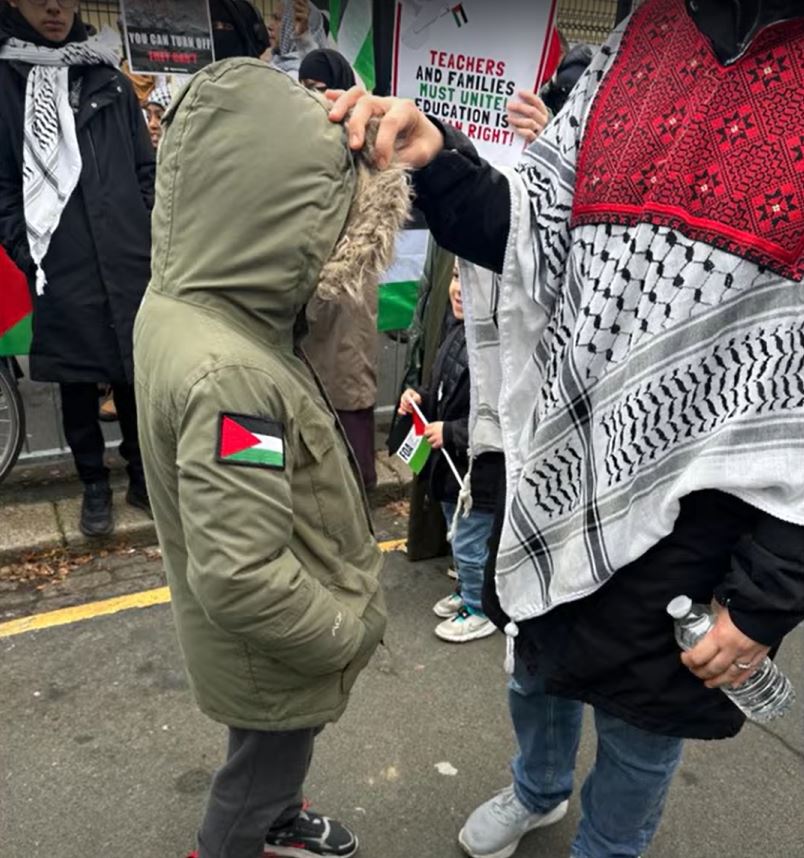
Yahya’s parents and seven other families were sent a letter from the school because their children wore Palestinian colours, or wore badges, jewellery and stickers. It referred to the more than 65 languages spoken at the school and over 100 countries represented, and said that “we do not promote one child’s background and beliefs above another”.
It reiterated the sentiments of the October letter, saying that worldwide conflicts could provoke tensions and different viewpoints and that extremist or divisive comments would lead to formal meetings and Prevent referrals.
For the next few days, Yahya continued to wear the flag and sticker and, during pickup and dropoff, his parents had a number of conversations with school staff who said it was a policy breach.
The child’s parents say they saw the school’s stance as aggressive and a curtailment of Yahya’s rights to express his views. They have since complained that Yahya was isolated and put through processes designed for pupils being punished, something that Barclay strongly denies. They were ultimately told he could not attend school wearing the flag and sticker.
In a public statement the school emphasised that both an internal and external investigation found no evidence of mistreatment, and that external safeguarding authorities had also reviewed allegations and found them to be false.
Protest movement
Within a few weeks the family’s dispute with Barclay would be amplified on social media, leading to death threats, while the disquiet over non-uniform day ultimately led to a prominent protest at the school gates on December 21. In the meantime, however, wider claims of censorship were building in Waltham Forest, one of the capital’s most diverse boroughs where an estimated 53 per cent of residents are from a minority ethnic background.
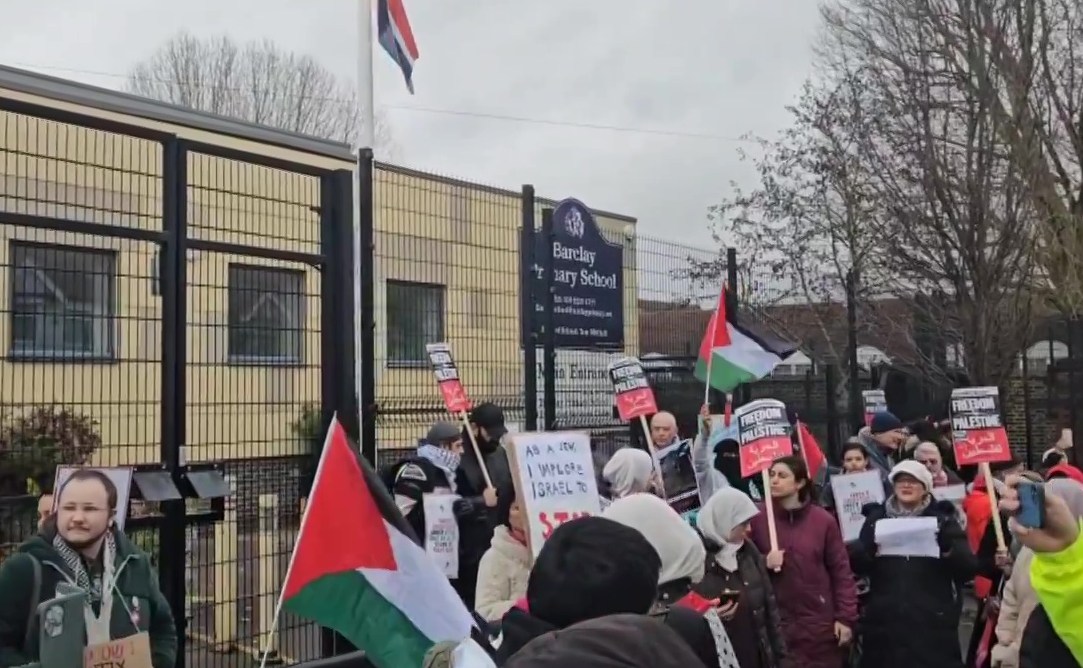
On November 24 more than 1,000 people gathered outside the borough’s town hall for a demonstration. Attended by parents at several local schools, it accused teaching staff of “shutting down discussion on Palestine and punishing children for having Palestinian flags painted on their hands”.
Stop the War, which spearheaded the national “school strikes for Palestine” campaign that encouraged thousands of children to walk out of their lessons to march through local towns to demand a ceasefire, helped parents and local activists to co-ordinate the protest. It provided stewards and organisational support, with one of its representatives delivering a speech to the crowd.
Social storm
The following month controversy was squarely focused on the school, thanks in part to an aspiring TikTok influencer and self-proclaimed trading guru. Thawban Zaki, who dropped out of Keele University last year to pursue a career in social media marketing and Forex trading, made videos attacking the school that were viewed hundreds of thousands of times.
The 22-year-old from London posted copies of the warning letters sent to parents and told his 88,000 followers that Barclay was “basically saying that if you support Palestine, you’re going to become a terrorist — or you already are one”.
Zaki, who shares trading tips online, made a series of other inflammatory claims about the school and accused teachers of bullying Yahya. In a letter to parents on December 18, the school said the TikTok video had amplified a series of “false and malicious allegations” and that it was leading to commentary that raised the risk of safety issues for staff and pupils.
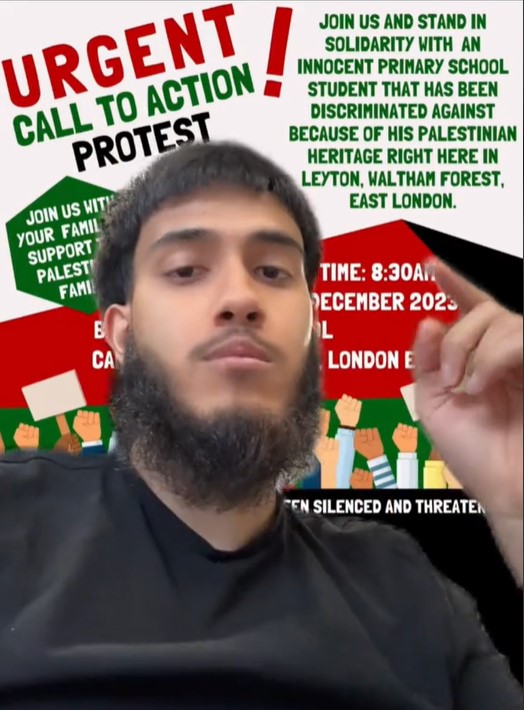
Two days later Zaki claimed on TikTok that the school was trying to silence him, before repeating allegations and encouraging viewers to attend a protest outside the school gates the next day.
Zaki’s first video was viewed about 250,000 times before it was taken down by TikTok for apparently breaching the platform’s rules. His second clip remains online and has been viewed nearly 128,000 times. Zaki, who did not respond to requests for comment, has separately boasted about how his TikTok videos make him thousands of pounds.
Tommy Robinson, the founder of the English Defence League, is among the far-right activists who have since commented on the issue on social media. Some online users targeted a trustee at the academy because she was also connected to an Orthodox Jewish primary school.
School closure
On December 21 hundreds of people waving flags and placards gathered at the primary school, the same day it announced the school would close early for Christmas. Protesters who gathered outside the school gates chanted “Barclay, Barclay, shame on you”, as well as “Teachers and families must unite, education is a human right”. The school hit out at “false and malicious fabrications” being spread online, warning it had resulted in “escalating threats against staff”.
Some parents, including the Achhala family, attended the protest and made complaints about the school’s enforcement of uniform rules. They queried the clampdown on Palestine flags when children had worn stickers supporting Ukraine after the invasion by Russia, after the school sent a letter referring to Ukraine a year earlier. The school had previously issued an apology for “any confusion or upset” over that issue, and parents were told no causes would be promoted in future.
Achhala said that he was not involved in organising the protest at the school gates and did not want a social media storm as it had “diverted” the narrative away from key issues. However, he gave an interview at the rally saying there had been “many incidents” in which his son had been “picked on”, “bullied by teachers” and “targeted” by staff who took him out of lessons and isolated him from classmates. “He’s very upset. He’s very popular at school — he misses his school friends.”
The same day Cage, the advocacy organisation, claimed it had uncovered an “alarming increase” in attacks against shows of support and solidarity for Palestine. Its article quoted Rasha saying that since Children in Need day her son had been traumatised by his experience, lost sleep and confidence, and had lost trust in his teachers.
Many others at the protest had no direct links to the school, described as “professional agitators” by one source. One masked figure, who calls himself No Face Bullhorn on Instagram and calls for “Free Free Palestine”, was present. He has promoted boycotts of businesses linked to Israel and attended a string of pro-Palestine events, thanked Zaki for his Barclay videoes and called for followers to attend the protest in “solidarity with an innocent primary school student”.
Also present was Carole Vincent, a former Big Brother contestant who lives in the constituency. She came to prominence in 2021 when she heckled Sir Keir Starmer over the £15 minimum wage during his speech at the Labour Party conference in Brighton.
Police investigation
After Christmas, the threats continued. On January 9, an anonymous caller made a series of racial slurs and an arson threat. The most recent threat was on January 19, when the school told parents it may have to revert to online learning if the issue escalated. The Metropolitan police is investigating a number of death threats to the school, both online and in writing
It comes after a teacher from Batley, West Yorkshire, was forced into hiding in March 2021 after showing pupils a cartoon of the Prophet Muhammad. Separately, Katharine Birbalsingh, head of Michaela Community School in northwest London, said her school received bomb threats after introducing a prayer ban.
On Barclay, Chief Superintendent Simon Crick, local policing commander in northeast London, said: “We are taking these threats incredibly seriously and would like to reassure pupils, teachers and parents that we are doing everything in our power to keep you safe while our investigation continues.
“Hate crime will not be tolerated in London and we will take action against those who commit offences and pose a threat to communities.”
Achhala, who is not working at the moment, and Rasha, a stay-at-home mother, said the family had been abused on the street due to their stance. They are appealing against the dismissal of their complaint to the school. Until the matter is resolved, they said, they will continue to homeschool Yahya, but insist they ultimately want him to return.
In a statement Barclay said that “we simply request that the vast majority of parents and pupils and all our staff can get on with the business of attending an outstanding local primary school”.
The school said it was “determinedly focusing on returning to a normal state of operation”.
The security guards this week patrolling the perimeter at home-time illustrate the scale of the challenge.
